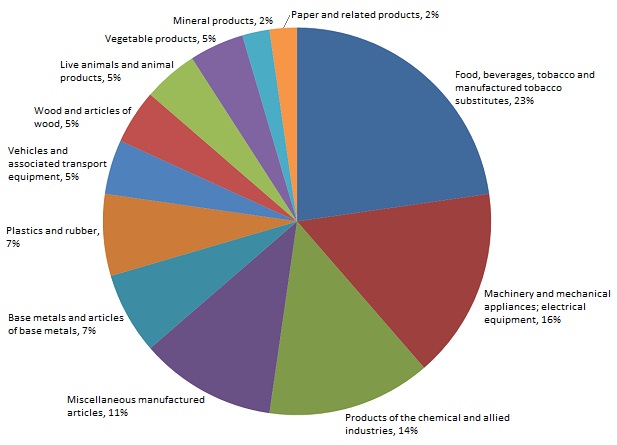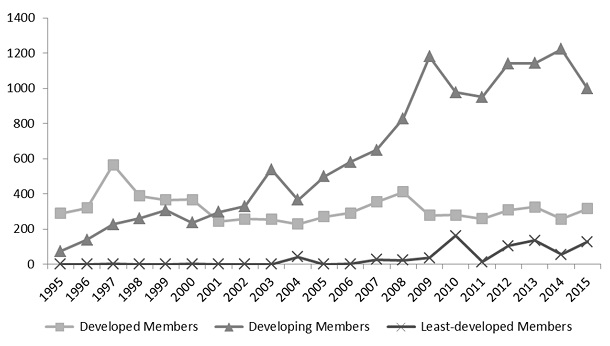News
DG Azevêdo praises work of standards committee on reaching 500th trade concern

WTO members raised the 500th specific trade concern at a meeting of the Committee on Technical Barriers to Trade on 8-10 March 2016, marking a milestone in their discussions about product regulations and standards. Director-General Roberto Azevêdo qualified this work as “essential to avoid concerns escalating into disputes and to keep trade flowing.”
DG Azevêdo said: “Today WTO Members discussed the 500th specific trade concern. It sounds technical but actually this is about dealing with all sorts of real-life issues that we all care about – from the use of chemicals in toys to the sugar, salt and fat content of our food. The WTO provides a forum for members to raise and resolve these concerns thereby avoiding them escalating into disputes. This is the unseen but essential daily work that keeps trade flowing – and it can only be done through the WTO.”
Specific trade concerns – food and drinks in focus
The Technical Barriers to Trade (TBT) Committee gives WTO members an opportunity to discuss each other’s product regulations and standards and the impact these have on companies and consumers. These discussions are called “specific trade concerns” – STCs for short.
According to WTO rules, members can regulate their products to protect consumer safety and health, but they need to do it in a way that does not make trade in these products unnecessarily burdensome. This preliminary discussion may contribute to avoid trade frictions from reaching the WTO’s Dispute Settlement Body (DSB). Since 1995, less than 2 per cent of STCs discussed in the TBT Committee have become trade disputes.
Breakdown of the main product groups addressed in STCs during 2015:

Source: WTO
Following the trend from 2015, STCs on food and drink regulations were at the top of the agenda of this meeting. Among the eleven new trade concerns raised, seven related to food and drinks. In total, 60 specific trade concerns were raised. The full list of STCs is here.
New STCs addressed at the meeting include:
-
Alcohol: Members discussed two new STCs on India’s draft food safety and standards regulation on alcoholic beverages, and South Africa’s amendment to regulations for health messages on labels of alcoholic beverages. Eight members (Australia, Canada, Chile, the European Union (EU), Guatemala, Japan, the United States (US) and New Zealand) questioned the consistency of India’s requirements with international standards and practices of the International Organisation of Vine and Wine (OIV) and the CODEX Alimentarius Commission, such as with respect to compositional requirements and alcohol content limits for beer, wine and spirits. Members said these new requirements could prevent certain alcohol products from being placed on the Indian market. India said it would consider members’ concerns in the finalization of the regulation.The EU and Canada supported South Africa’s objective of reducing the harmful use of alcohol, but expressed concerns about the changes to alcohol regulations requiring manufacturers to use seven different health warning labels during a twelve-month cycle. South Africa emphasized the importance of reducing the harmful use of alcohol for public health, and said that a public consultation was conducted on the regulation and all comments received were considered.
-
Infant formula: Two new STCs were raised on infant formula; the first regarding China’s infant formula registration requirements, and the second on Thailand's draft act on marketing and promotion of food for infants and young children.
The EU, Japan, Korea, and New Zealand voiced concerns about China’s requirements that would limit the number of infant formula products that a company could register to nine recipes, and three product lines. Members questioned the rationale for these limits, and asked about possible duplication with existing registration requirements. China said that the comment period on the notification of this regulation closed a few days before the meeting, and that the concerns of members would be brought back to Beijing for discussion.
While the US expressed strong support for Thailand's efforts to ensure that marketing of infant formula did not negatively impact breastfeeding, it asked about the scientific explanation for Thailand's proposed ban on marketing and advertising of follow-up formula intended for children up to 36 months of age. Thailand said this measure had recently been notified to the WTO, and that it would forward the US comments to the Thai Ministry of Public Health for consideration.
Information sharing via thematic sessions
Members launched the work programme for 2016-2018 (agreed in the Seventh Triennial Review) by discussing how they are working with each other in their Regional Trade Agreements and Free Trade Agreements to reduce barriers to trade from testing and certification, as part of their work on conformity assessment procedures. The Committee heard presentations about developments in the Trans-Pacific Partnership (TPP) – concluded on 5 October 2015 by 12 countries – the Southern African Development Community (SADC) and the Association of Southeast Asian Nations (ASEAN), as well as bilateral arrangements in the EU-Canada Comprehensive Economic and Trade Agreement (CETA), EU-Korea FTA, Switzerland-China FTA, China-New Zealand FTA, and China-Korea FTA. Members also shared their experiences in using international and regional schemes for conformity assessment to facilitate trade, such as: the IECEE CB Scheme; OECD Good Laboratory Practice (GLP) and Mutual Acceptance of Data (MAD); OIML Mutual Acceptance Arrangement; ILAC/IAF; UNECE type approval certificates for motor vehicles; and the Pharmaceutical Inspection Co-operation Scheme (PIC/S).
Members also discussed how they use regulatory impact assessments (RIAs) to assess the impact that regulations have on trade. Five Members (Korea, China, US, Australia and EU) shared their approaches, and the Organization for Economic Cooperation and Development (OECD) explained their work on regulatory policy and governance. Some main points were the importance of public consultations, methodologies for identifying and assessing the trade impacts of regulation in RIAs, and which regulations should be subject to RIA.
Annual Review of the TBT Committee
The Committee completed its 21st annual review, which reports on its 2015 activities. During the previous year, notifications decreased by 12% compared to 2014 (to a total of 1,989 notifications). Nevertheless, the trend since 2005 has been an upward one driven increasingly by developing members. In 2015, developing Members continued to submit significantly more new notifications than developed members – also the number of notifications from LDCs increased during the year. A total of 37 technical assistance (TA) activities on TBT were organized by the WTO in 2015, and TBT-related TA activities are in high demand by WTO members.
TBT notifications by WTO members, 1995-2015:

Developments in observer organizations to the TBT Committee
-
The United Nations Economic Commission for Europe gave an update on the 25th session of the Working Party on Regulatory Cooperation and Standardization Policies, which adopted a revised recommendation for the “International Model for Transnational Regulatory Cooperation Based on Good Regulatory Practice”.
-
The African Organisation for Standardisation (ARSO) – which received ad hoc observer status at the November meeting – presented its work to promote implementation of the TBT Agreement in Africa, including through technical assistance.
-
The International Standards Organization (ISO) introduced its new ISO Action Plan for developing countries, a technical assistance programme launched in January, which focuses on strengthening the national quality infrastructure of ISO members.
-
The International Electrotechnical Commission (IEC) announced Uzbekistan's recent membership. They also introduced their cooperation work with the National Metrology Institute in Germany (PTB Germany) through capacity-building events, including one recently held in Tashkent, Uzbekistan.
-
The African, Caribbean and Pacific Group of countries gave an update on capacity-building and technical assistance initiatives on TBT-related matters in Geneva.
-
The International Electrotechnical Commission (IEC) reported on the Africa Smart Grid Forum held in Cairo on 5-7 March, and presented the work of the IEC Africa Regional Center (IEC-AFRC) in Nairobi, Kenya.
-
The World Health Organization (WHO) presented its recent work on nutrition labelling, including development of guiding principles and a guidance framework manual to support countries in implementing effective front-of-pack labelling systems.
-
The International Organization of Legal Metrology (OIML) announced the launch of on e-learning training programme for metrology aimed at developing countries.
-
The CODEX Alimentarius said that the absence of Codex guidance on a topic does not automatically mean that a measure adopted by a WTO member is not in line with Codex. The representative also gave updates on the work of CODEX.
The full list of observer organizations working with the TBT Committee is here.
Next meeting
14-16 June: TBT Committee regular and informal meetings – delegations will continue discussions on standards and commence an exchange in the area of regulatory cooperation.
Downloads
- Twenty-First Annual Review of the Implementation and Operation of the TBT Agreement | Note by the Secretariat Revision, 24 March 2016
- Thematic sessions on Conformity Assessment Procedures: Report by the Chairperson to the TBT Committee | 17 March 2016
- Thematic session on Good Regulatory Practice: Report by the Chairperson to the TBT Committee | 17 March 2016

